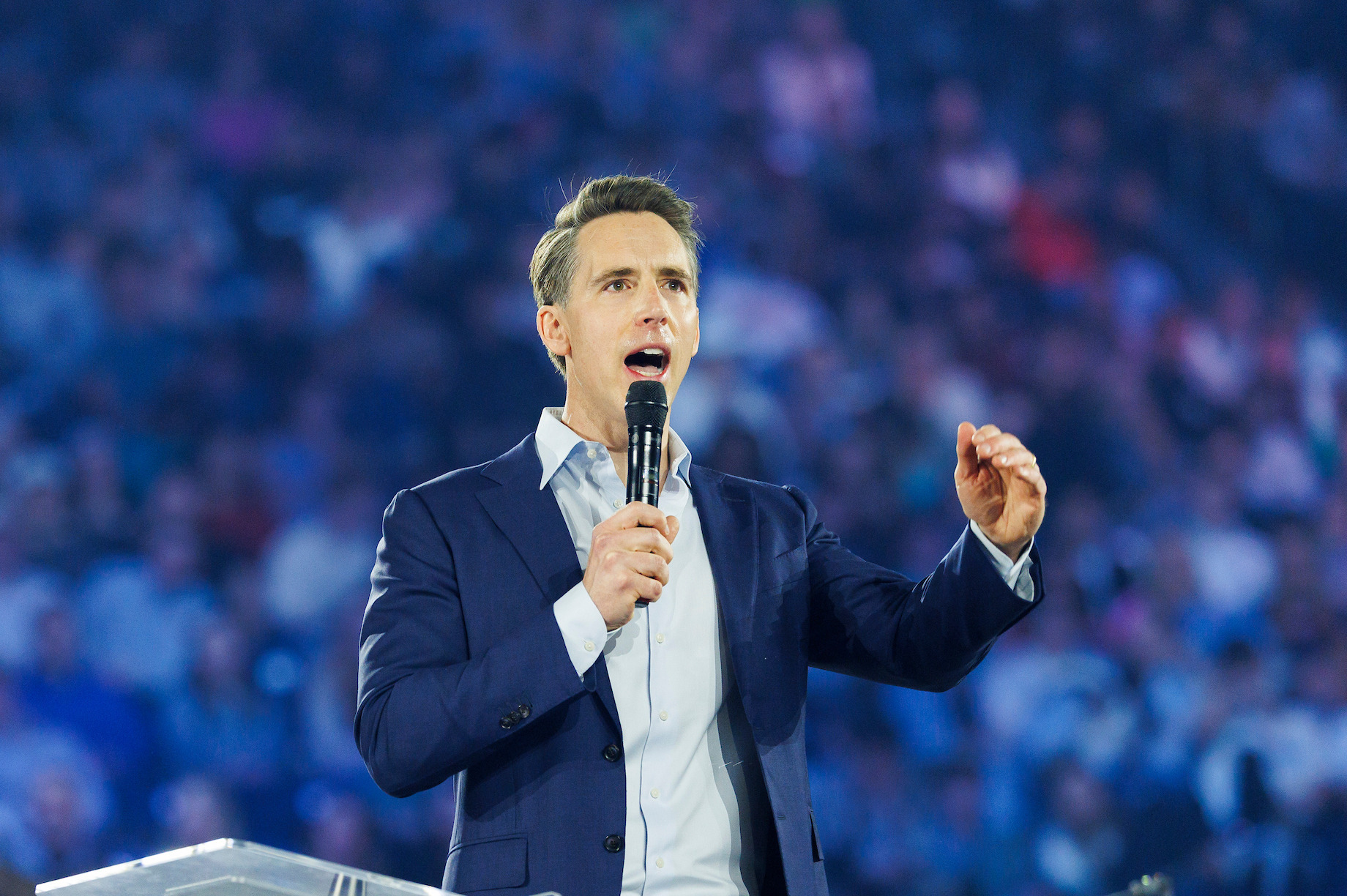Search News Archives
Filter News Articles
Additional Navigation
College football legend Lou Holtz talks career, faith, and the right attitude
February 19, 2020 : By Ryan Klinker - Liberty University News Service

At 83 years old and with a long career characterized by strong leadership and Christian faith, College Football Hall of Fame Head Coach Lou Holtz offered Liberty University students some insight into the life rules by which he guides himself and others.
Holtz was introduced at Convocation by Liberty President Jerry Falwell, who quickly outlined Holtz’s illustrious career in college football. Holtz is the only coach to take six different programs to a bowl game, five of which he won, and led Notre Dame to a victory in the 1989 Fiesta Bowl that earned it the national championship that year.
Holtz began by pointing out his respect for Liberty, which he described as a place where students can freely express and live out their Christian faith.
“I hope you realize how fortunate you are to be at a university where you can go and express your faith in God; please don’t take that for granted,” he said. “I don’t believe you can accomplish an awful lot in life, anything worthwhile, without a faith in God.”
Holtz lives and works by three simple mottos: do what is right, do everything to the best of your ability, and show people you care. There is no wrong time to do what is right and no right time to do what is wrong, he explained, and anyone who is unsure of what is right ought to look to the Bible.
 “God has given us a lot of power — power to love, think, create, imagine, plan — but the greatest power we have is the power to choose,” Holtz said. “You choose whether you’re going to act or procrastinate, believe or doubt, pray or curse, help or hurt, succeed or fail. Life is a matter of choices, and the attitude you choose is by far the most important choice you make every day.”
“God has given us a lot of power — power to love, think, create, imagine, plan — but the greatest power we have is the power to choose,” Holtz said. “You choose whether you’re going to act or procrastinate, believe or doubt, pray or curse, help or hurt, succeed or fail. Life is a matter of choices, and the attitude you choose is by far the most important choice you make every day.”
Holtz chooses an attitude based in prayer, and even in the times of adversity, he said that he never failed to pick himself up and believe in God. In his words, “Quitting is a permanent solution to a temporary problem.”
“You can succeed when no one believes in you, and if you believe in yourself and God, you’ll find a way,” he said. “I can’t begin to tell you how many times I got down on my knees and prayed to the good Lord, and when I walked into a team meeting or a staff meeting, there was no doubt in my mind that we were going to persevere.”
Holtz believes that not every person can reach the top of their field, but everyone can become the best person they’re capable of being. Each person has talents and abilities gifted to them by God, and there is an obligation to use those gifts to glorify Him.

“People ask me what the difference is between athletes today and 40 years ago — today everybody wants to talk about their rights and privileges, and 40 years ago we talked about our obligations and responsibilities,” Holtz said. “If you want to fail, you have the right to fail, but you do not have the right to cause others to fail because we don’t do everything to the best of our ability.”
Born in Follansbee, W.Va., in the midst of the Great Depression, Holtz spent seven and a half years of his childhood in a house with a single bedroom that he shared with his sister and parents and a bathroom with no bath, shower, or sink. There were no food stamps, welfare checks, or financial safety net in those days, yet Holtz said he had a privileged upbringing.
“I say I was born with a silver spoon in my mouth, not because of what we had … but because I was born in this country and I was told, if I was willing to work hard and have a strong faith in God, I could have a successful life,” Holtz said.
Throughout his life, Holtz said that he has never met someone who did not deserve encouragement and kindness, and he urged students to not hold back on expressing their love and admiration for those around them. He recalled an interview in which his wife, Beth, was asked what her battle with cancer had taught her, and she answered: “I learned how much my family loved me.”

“We didn’t love her any more (than we already did), but we showed it,” Holtz said. “Why do we have to wait for someone to have a catastrophe or for something to go wrong to reach out? Why do we wait until the funeral to say how much we appreciate them?”
He explained that love, specifically the love that comes from God, cannot be conquered if it is embedded into an organization or relationship, and he sees this at Liberty.
“If you build love in a football team, in a family, in a university, it’s so powerful it cannot be destroyed,” Holtz said. “I’ve been on campus for probably 36 hours now, and the thing that’s obvious to me is the total commitment to excellence that Liberty University has. I look at the cleanliness, the way you do things, the way it’s organized. That’s why it’s so important to do everything to the best of your ability, it’s so people know you’re totally committed to excellence.”
Holtz closed Convocation by speaking with President Falwell about a letter Falwell received in 2012 from Notre Dame’s President Emeritus Rev. Theodore Hesburgh, who said Liberty’s rise in football is reminiscent of the moment when the Fighting Irish began to grow into the historic program it is today. Following a victory in 1913 against Army, the top team in the country at the time, Notre Dame began to gain fans across the nation, and Hesburgh’s letter stated that Liberty is on pace to reach that same level of success.


